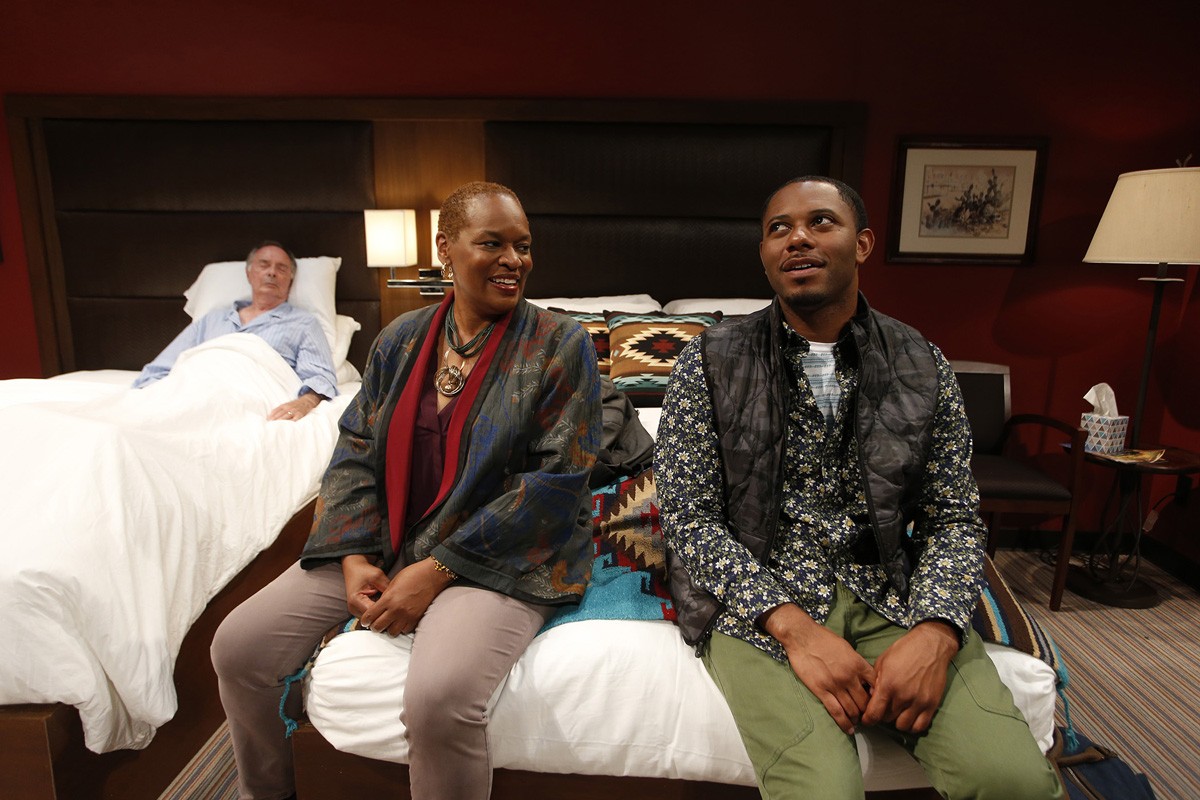
Some plays seem to take an eternity to say very little, if anything. Then, you get those like Rachel Bonds’ Curve of Departure, which somehow manages to say a great deal in very little time. Everything from the right to die and same-sex partnerships to self-sacrifice and the lack of California culture is touched upon in a crisp, compact 80 minutes, executed in such an effortless, skillful and heartfelt way that it kind of makes you wish it—and its four compelling, relatable, characters—would stick around longer.
A self-described ragtag group has assembled in a New Mexico hotel room on the eve of the funeral of the man who ties the foursome together. They are Rudy (a terrific Allan Miller, one of those actors you can’t quite place, though he has more than 300 film, TV and stage credits), a senior on the cusp of full-blown dementia; Linda (a strong Kim Staunton), his primary caregiver and confidante; her son, Felix (a multilayered Larry Powell); and his lover, Jackson (an earnest, affecting Christian Barillas). They have gathered to reluctantly mourn the passing of Rudy’s son, who also happens to be Linda’s ex-husband and Felix’s father.
Reluctantly because the dead guy, as well as the new family that supplanted his first, was apparently a piece of work, so the conflict between honoring someone’s memory and dealing with mixed feelings about that person is quite clear. But that’s just the setup in this deceptively deep, beguilingly complex work.
The events are set entirely in that hotel room: late at night, when Felix and Jackson arrive, and the next morning on the balcony. It is a small play with not particularly interesting people in terms of what they do or have accomplished: a teacher, a business-oriented tech guy, a barista, a wise-cracking old guy. But they all find themselves in very complicated situations, and it’s evident early on that the concerns of this play deal far less with who’s already gone, and far more with the incredibly difficult, very alive choices the four are confronting.
Those choices involve either letting go or jumping in. And while two of the characters are completely fine with the sacrifices that need to be made, two of them are far less certain; they may not be perfectly content with their lives, but they fear the uncertainty of the direction that these drastic steps could spin their lives toward.
One life is clearly close to ending: Rudy, a man who veers between animated verbal histrionics with more than their share of unintentional poetry and constant runs to the bathroom. He supplies most of the comic relief, but Miller’s masterful performance captures the nuance and turbulent currents beneath the apparently glib and sarcastic surface, rendering a complete character that could have slipped into smart-ass, old-guy caricature. In contrast, Jackson’s life is just beginning, in terms of seriousness. The product of a broken home in Bakersfield, he is on the verge of legally adopting his 2-year-old niece, the child of his drug-addicted sister and her abusive partner.
While both Rudy’s and Jackson’s destinies seem laid out, the stars aren’t as clear for the mother-son tandem of Linda and Felix. They aren’t as ready as their respective partners (one romantic, the other filial). Even though Linda emphatically tells others that the most important thing in life is making the choice to do what must be done, she also realizes the terrifying consequences that choice often embodies, the biggest being the fear of the unknown.
Another strength of Bonds’ script is how easily she dispatches what could, in lesser dramaturgical hands, be heavy-handed impediments: the fact that Linda and Felix are African-American, and Felix and Jackson are gay. For one of the rare times I can remember in a contemporary American play, sexuality and race just are in this play. The only moment either is even alluded to is when Felix expresses his frustration at the bureaucracy involved in two men adopting a child. Other than that, there’s no attempt to explain or justify, politicize or polemicize.
There are some issues with Bonds’ play that even her smart and quick dialogue, the excellent ensemble, and director Mike Donahue’s sensitive, uncluttered direction can’t fix, most notably the question of why Linda is the person most responsible for her father-in-law’s life. But they’re minor quibbles. This is a taut, engrossing play with more than its fair share of laughs, something that reveals extraordinary moments in the lives of very ordinary people who, like all of us, just need to do what must be done, but who have a hell of a time deciding to do it.
Curve of Departure at South Coast Repertory, 655 Town Center Dr., Costa Mesa, (714) 708-5555; www.scr.org. Tues.-Fri., 7:45 p.m.; Sat.-Sun., 2 & 7:45 p.m. Through Oct. 15. $20-$83.
Joel Beers has written about theater and other stuff for this infernal rag since its very first issue in, when was that again???


One Reply to “Curve of Departure at South Coast Rep Finds Poetry in the Seeming Mundanity of Life”